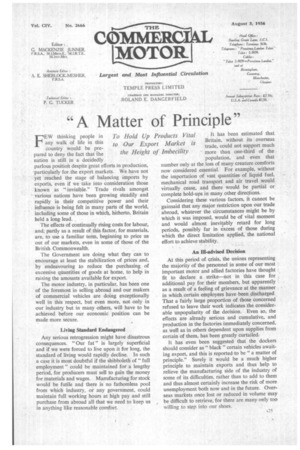"A Matter of Principle"
Page 27

If you've noticed an error in this article please click here to report it so we can fix it.
FEW thinking people in any walk of life in this country would be prepared to deny the fact that he nation is still in a decidedly parlous position despite great efforts in production, -particularly for the export markets. We have not yet reached the stage of balancing imports by exports, even if we take into consideration those known as "invisible," Trade rivals amongst various nations have been growing steadily and rapidly in their competitive power and their influence is being felt in many parts of the world, including some of those in which, hitherto, Britain held a long lead.
The effects of continually rising costs for labour, and, partly as a result of this factor, for materials, are, to use a familiar term, beginning to price us out of our markets, even in some of those of the British Commonwealth.
The Government are doing what they can to encourage at least the stabilization of prices and, by endeavouring to reduce the purchasing of excessive quantities of goods at home, to help in raising the amounts available for export.
The motor industry, in particular, has been one of the foremost in selling abroad and our makers of commercial vehicles are doing exceptionally well in this respect, but even more, not only in our industry but in many others, will have to be achieved before our economic position can be made more secure.
Living Standard Endangered Any serious retrogression might have disastrous consequences. 'Our fat" is largely superficial and if we were forced to live upon it for long, the standard of living would rapidly decline. In such a case it is most doubtful if the shibboleth of "full employment" could be maintained for a lengthy period, for producers must sell to gain the money for materials and wages. Manufacturing for stock would be futile and there is no fathomless pool from which industry, or any government, could maintain full working hours at high pay and still purchase from abroad all that we need to keep us in anything like reasonable comfort. It has been estimated that Britain, without its overseas trade, could not support much more than one-third of the population, and even that number only at the loss of many creature comforts now considered essential. For example, without the importation of vast quantities of liquid fuel, mechanical road transport and air travel would virtually cease, and there would be partial or complete hold-ups in many other directions.
Considering these various factors, it cannot be gainsaid that any major restriction upon our trade abroad, whatever the circumstances might be by which it was imposed, would be of vital moment and would almost inevitably retard for long periods, possibly far in excess of those during which the direct limitation applied, the national effort to achieve stability.
An Ill-advised Decision At this period of crisis, the unions representing the majority of the personnel in some of our most important motor and allied factories have thought , fit to declare a strike—not in this case for additional pay for their members, but apparently as a result of a feeling of grievance at the manner in which certain employees have -been discharged. That a fairly large proportion of those concerned refused to leave their work indicates the considerable unpopularity of the decision. Even so, the effects are already serious and cumulative, and production in the factories immediately concerned, as well as in others dependent upon supplies from certain of them, has been greatly curtailed.
It has even been suggested that the dockers should consider as "black "certain vehicles awaiting export, and this is reported to be "a matter of principle." Surely it would be a much higher principle to maintain exports and thus help to relieve the manufacturing side of the industry of some of its difficulties, rather than to add to them and thus almost certainly increase the risk of more unemployment both now and in the future. Overseas markets once lost or reduced in volume may , be difficult to retrieve, for there are many only too willing to step into our shoes.




































































































